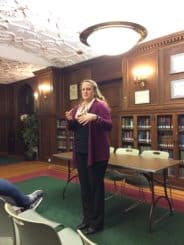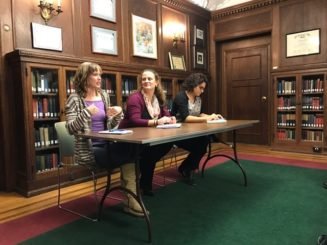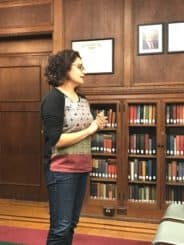People aren’t monsters. They have stories.
Christians for Social Action has recently joined the board of Churches for Middle East Peace (CMEP), an organization that works to encourage U.S. policies that actively promote a just, lasting, and comprehensive resolution of the Israeli-Palestinian conflict, ensuring security, human rights and religious freedom for all people of the region. We joined CMEP because we think one of the most important steps to solving seemingly intractable problems is to encourage, promote, and engage in challenging dialogues, and CMEP shares that commitment.
 CMEP Executive Director, Mae Elise Cannon, recently visited CSA with Sharona Weiss from Jerusalem and Shadia Qubti from Nazareth to discuss peacebuilding in the Holy Land. We were joined by about 30 students and community members for an evening of dialogue led by these three women, each deeply committed to and working for peace from very different cultural locations.
CMEP Executive Director, Mae Elise Cannon, recently visited CSA with Sharona Weiss from Jerusalem and Shadia Qubti from Nazareth to discuss peacebuilding in the Holy Land. We were joined by about 30 students and community members for an evening of dialogue led by these three women, each deeply committed to and working for peace from very different cultural locations.
 On the heels of a divisive Presidential election, and on the verge of an administration that threatens to further separate, it seems important to gather in small groups to listen to real human people tell their real human stories. “People aren’t monsters. They have stories,” Sharona reminded the gathered group. What would wicked problems, intractable conflicts, look like if warring factions listened to one another’s stories?
On the heels of a divisive Presidential election, and on the verge of an administration that threatens to further separate, it seems important to gather in small groups to listen to real human people tell their real human stories. “People aren’t monsters. They have stories,” Sharona reminded the gathered group. What would wicked problems, intractable conflicts, look like if warring factions listened to one another’s stories?
What would happen if we remembered that the “peacemakers” that Jesus blessed were active? Peacemakers. Makers of peace. Agents of change.
 “The more I get to know my enemy, I get to know myself,” said Shadia as she discussed ways that Palestinians and Israelis are working to make radical love visible, and how those of us in the U.S. church can help, rather than hinder, this process.
“The more I get to know my enemy, I get to know myself,” said Shadia as she discussed ways that Palestinians and Israelis are working to make radical love visible, and how those of us in the U.S. church can help, rather than hinder, this process.
How do we get to know our enemies? For those who wish to know more about the situation on the ground in Israel and Palestine, a multi-narrative tour is a good step. CMEP is leading a Holy Land Journey this fall.
Closer to home, here are three things I’m trying to do these days to help myself remember that Jesus said to love our enemies, love our neighbors, and care for everybody:
- Get off of Facebook and Twitter and have face-to-face conversations with people who don’t look like me, think like me, or believe like me.
- Read up on current events from a variety of writers. And always check sources.
- Spend more time listening than speaking. (Or, “Talk less. Smile more.“)
Sarah Withrow King is the Deputy Director of the Sider Center, the co-director of CreatureKind, and the author of two books, Animals Are Not Ours (No Really, They’re Not): An Evangelical Animal Liberation Theology (Wipf & Stock) and Vegangelical: How Caring for Animals Can Shape Your Faith (Zondervan).



2 Responses
Your commitment to ‘get off of Facebook and Twitter’, particularly for the purpose you mention, is both admirable and challenging. A bearded man I know pretty well believes with all of his Swiss cheese-looking soul that ‘Social Media’ stands squarely in the path of so much that is so much more REAL.
Like the people you mentioned.
I congratulate you on your wisdom and wish you well in executing your plan.
Sarah, I think you struck an important point about your desire to have more “face-to-face” conversations with people who, in one way or another, are “different” from you. I agree that it is important for us to understand the current societal issues that are troubling for many people, irrespective of how they look or what belief systems they are a part of. As you begin this new plan of engaging others more often, I wish you well. Congratulations to you and others at the Sider Center for the kind of advocacy that is being carried out for those who find themselves at the margins of society.